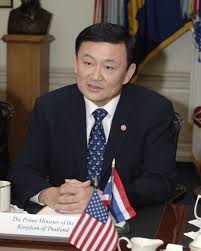BY NATALIE VAN BOOVEN
Co-Editor-in-Chief
(Refer to Thailand Part 1 prior to reading)
Before I describe the events that led up to the political crisis of 2005-06 (which marks the fourth period in Thailand’s recent history), I thought I would take a moment to describe the man at the center of the hullabaloo.

Thaksin Shinawatra was born in San Kamphaeng, a province of Chiang Mai northwestern Thailand on July 26, 1949, to one of the area’s wealthiest families. His story ultimately begins with his paternal great-grandfather, Seng Sae Khu, who emigrated from China to Thailand in the 1860s and became wealthy through tax farming. Seng’s eldest son, Chiang Sae Khu, was born in 1890; he became wealthy through construction, finance, property development and silk making. Because of Thailand’s anti-Chinese movement in the years before World War II, Chiang’s eldest son, Sak Sae Khu, changed the family surname to Shinawatra in 1938. Sak’s brother and Thaksin’s father, Lert Shinawatra, was born in 1919; from 1968-76, he was a member of the now-defunct Liberal party. After 1976, he grew flowers and oranges as well as opened a car-and-motorcycle dealership, a coffee shop, a gas station and two cinemas.
As for Thaksin himself, in 1973, he graduated from the Armed Forces Academies Preparatory School and joined the Royal Thai Police. In 1975, he got his master’s degree in criminal justice from Eastern Kentucky University; in 1978, he got his doctorate in criminal justice from Sam Houston State University. By the time he resigned his commission as a lieutenant colonel in 1987, he had become Deputy Superintendent of the Policy and Planning Subdivision of the General Staff Division of the Metropolitan Police Bureau.
Once Thaksin left the police, he wasted no time in focusing on his business ventures. While still an officer and with his wife of 28 years, Potjaman Damapong (they divorced in 2008), he invested in an apartment building, a cinema and a silk shop, but he ended up owing at least 50 million baht (ca. $1.5 million USD) when those projects failed. Still, he persevered; and fortune came his way in 1986, when he founded Advanced Info Service, a computer-rental service that eventually became Thailand’s biggest cell-phone operator. With the success of AIS, he launched Shin Satellite (aka ThaiCom) and what is now called Advanced Data Network, both of which helped him become one of the wealthiest people in Thailand. In fact, out of 1565 names on Forbes’ Billionaires List, he ranks 1092nd with a net worth of $1.6 billion—down from the $2.3 billion he was worth before the 2006 coup.
Here is where Thaksin’s story would have ended, had Major General Chamlong Srimuang not called on Thaksin in 1994 to join him in politics. The party Thaksin was called on to join, the Palang Dharma Party, won only a few seats in parliament; but then the government under Banharn Silpa-Archa collapsed, forcing elections to be called again. Thaksin became a deputy Prime Minister under the leadership of General Chavalit Yongchaiyudh, many of whose actions he would reprise five years later. Of all the General’s accomplishments, the most notable was making a new political party from scratch: the New Aspiration Party. What kept the NAP going was not ideology as much as politicians wanting power (which is why it no longer exists), but it was Thailand’s first political party to come to power based on support from the comparatively poor northeast. Even though it lacked enough votes to secure an absolute majority (251/500 seats), it garnered more votes than the other parties did, which meant it had the chance to form and lead a new government, as per Thai political tradition.
Unfortunately, about a month and a half before Thaksin became deputy Prime Minister, the General’s government floated the baht, which lessened its value and triggered the Asian Financial Crisis of 1997-98. The decision to float the baht was one of several factors responsible for the Crisis, which was aggravated by the government’s attempts to keep the baht from losing any more of its value. The NAP soon became the national scapegoat; so the Democrat party assembled a new coalition government, chose Chuan Leekpai to be Prime Minister and started implementing reforms.
Being out of office gave Thaksin plenty of time to figure out his next political move. Taking a cue from the General, the first thing he did was make a new political party from scratch: the Thai Rak Thai (TRT) Party. Like the NAP, the TRT came to power on a populist campaign. For nearly all of Thailand’s history, Bangkok’s wealthy all but ignored their poorer counterparts, especially those living in the outer provinces in the northeast. Therefore, to come to power, monopolizing the region would be all one had to do. His energy and charisma took care of the rest, along with his promise to make the government more honest. However, even though his politics were satisfactory, his money would go a long way toward quashing everything he worked to realize.